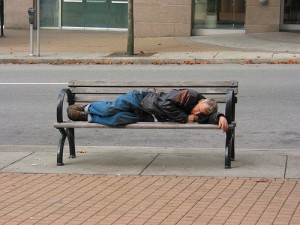 There was a time when the phrase “check-in” was associated with things like the front desk of a hotel, the ticket counter at an airport or the main entrance to a conference center (“gotta go check-in and pickup up my badge to show that I’m a speaker and didn’t actually have to pay to get in like everyone else…”).
There was a time when the phrase “check-in” was associated with things like the front desk of a hotel, the ticket counter at an airport or the main entrance to a conference center (“gotta go check-in and pickup up my badge to show that I’m a speaker and didn’t actually have to pay to get in like everyone else…”).
But with the advent of social media and location-aware applications, the phrase “check-in” took on a totally new, and much simpler meaning: “I’m here”. And now, I believe, it’s meaning might be about to change yet again, from “I’m here” to “here’s why”.
The evolution of the social check-in
The social check-in has been around since before the days of the pony express – we used the available media to tell our friends and loved ones that we had arrived at a particular destination. We were not only there, but we wanted them to know we were safe. It was a basic, and necessary, part of life as the world expanded around us. But with the arrival of social media, businesses began to realize that the check-in could be something more – it could be entertaining, it could be fun, it could be competitive and it could drive business.
Companies like Foursquare, Shopkick and Facebook gamified it, made it competitive and engaging, turning it into something that they hoped would drive their business, or the business of others (check out my post on Gamification and the Gaming of Foursquare for some background on that topic). And to an extent, they were right. Checking-in was Fun! You could check-in to your favorite coffee shop, broadcast it to the world and even get points, perhaps a discount on a cup of coffee or become the Mayor of Anywhere.
But what really is the value of being the Mayor of some local hangout? Not much, except perhaps the bragging rights within your own social graph (example: I have a couple of friends who are on a mission to see who can check-in to the most Starbucks).
I’m not sure people care about social check-in points or likes as much as they used to.
Most of the people I know check-in to engage with their friends, or to simply let them know what they are doing or where they can be found. Businesses assume that a check-in to their location is an endorsement, that they’ve captured another “potential customer” (a concept that my friend Alan Berkson, @berkson0 of the Intelligist Group, would argue is “so last century”).
In fact, I’ve seen more than a few people check-in with comments like “worst service ever” – so perhaps that endorsement isn’t quite as real as many people think (ironically, with Foursquare you can check-in, add a negative comment and still get your points – an interesting way of making YOUR point, especially if you rebroadcast that check-in through other, much larger, social media networks).
And it is here, where people are starting to use the social check-in as a statement, as a way to question what they see around them, that I think we are approaching the point where the check-in can become so much more than it is today.
The 4 components of the new social check-in
The emerging social check-in has four basic components (let’s toss aside points, likes, mayorships, etc. for a moment). They are:
- The personal check-in itself (somebody deciding that they want to check-in to a particular place/event/etc. and share it with their friends),
- The place/event/etc. where the check-in occurs (which could be a fixed location or a time-sensitive event),
- The people within (or in some cases peripheral to) the social graph of the person who will see the check-in, and (most importantly)
- The statement or comment that the check-in conveys to those who see it (the *influence factor* of the check-in).
With those four points in mind, let’s consider two different check-ins:
“It’s about me”
The all-too-common “Hanging with my friends at the Corner Bistro” – simple, to the point and letting people know not only who you are with but where you can be found. It’s an invitation (and yes, I made this one up).
“It’s about the world”
Now let’s consider another, this one via Twitter/Foursquare (that was an actual Foursquare check-in by a friend): “He’s here everyday not begging, just …dying? What do to? (@ Old Guy In bench)” – this isn’t a here I am, come find me check-in, it’s an observation, i t’s a social comment, it’s non-judgmental and it has both a purpose and meaning far deeper than Foursquare ever envisioned. This is what I consider a social check-in “with cause.”
Let’s check-in to social causes
A couple of months ago, I had the opportunity to chat with a few people inside the social check-in space. It was an informal chat that got me thinking about the value of being able to check-in to “social events”, not just businesses. When I came across the “Old Guy” Foursquare check-in, it sparked an interesting thought – we have the opportunity put real meaning behind check-ins. Consider the following:
- Checking into “certified” Social Events would be a good thing. With most check-in tools, you can create your own locations, so setting up a location for a charity event is possible, but it isn’t necessarily time sensitive and doesn’t necessarily mean that the event is an actual charity (social good) event. I think we can improve on this.
- Checking into a Social Event *remotely* (to show support for the cause) would be an even better thing. Call it a “like” or a “support” – but letting people express their backing for an event – while it is taking place – is something I consider worthwhile.
- Checking into a Social Event (either on site or remotely) and being able to *donate via PayPal* would be a great thing. You’ve got my attention, you’ve got my support, why not give me the opportunity to contribute?
The ramifications of such a strategy could be a great boost for both charitable causes/events as well as business sponsors, looking to both give back to the social community and improve their image/position within their consumer community. In this light, the check-in could become a powerful tool of influence.
Can this be done? I believe so. But I’m just one voice. What do you think?
Would you as a business representative support or find value in supporting or sponsoring such a program? Would you as a consumer or individual be willing to check-in to show your support or give a donation to a cause or an event?
I know I would.
For an out-of-the-box insight on the whole notion of generational check-ins and the impact of pervasive social connectivity, check out Alan Berkson’s excellent post Turn On, Check In, Hang Out!
Photo courtesy of Travis Nep Smith
